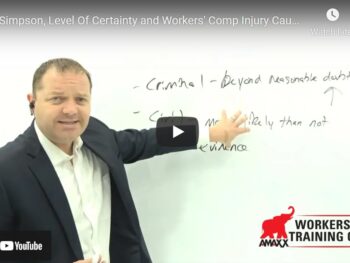Social media is web-based interaction that is highly accessible and utilizes scalable publishing techniques. According to Wikipedia, there are over 300 “active” and “well known” social media sites. Some of the more commonly used social media sites include Facebook, Twitter and Linked In.
Why Should Claim Handlers Care?
Even though there has been a steady decline in the use of social media by American youth, it continues to be a popular form of communication and interaction among Generation X’ers and Baby Boomers. Unlike other forms of communication, social media leaves a permanent record that is digital and easily discoverable. There are also a growing number of data collection services such as Spokeo.com, which compile information from social networks, marketing surveys, real estate listing, government censuses resources and other accessible sources.
With the rise in the collection of data, there are several benefits to the workers’ compensation claim handler.
• Cost effective form of surveillance: Obtain background information and checking honesty/integrity of claimant;
• Discovery: Monitor post-injury activities, or verify limitations or severity of injury; and
• Legal ramifications: Credibility of the party/witness and facts of case – damages/liability, jury considerations, etc.
Ethics for Social Media
Attorneys using social media as part of their discovery efforts should be aware of ethical issues. Professional conduct rules may vary from jurisdiction-to-jurisdiction, so it is important to check when handling any case.
• RULE 1.6: Confidentiality of Information
• RULE 4.2: Communication with Person Represented by Counsel
• RULE 4.3: Dealing With Unrepresented Person
• RULE 5.3: Responsibility for Non-Lawyer Assistants
• RULE 8.4: Misconduct
Lawyers should also be aware that in at least one jurisdiction, failure to investigate ethically social networking sites violated the lawyer’s duty of competence and diligence.
Case Law and Social Media
Courts are becoming more aware of social media and its societal implications on the judicial system. It is important to be aware of legal precedent and how it can influence your case.
• Beye v. Horizon Blue Cross Blue Shield of N.J., No. 2:06-cv-5377-FSH-PS, (D.N.J. Dec. 14, 2007). The Insurer sought production of all e-mails, journals, diaries, and communications involving eating disorders or symptoms related to the Claimant. The court allowed for broad discovery related to Facebook and MySpace that was shared with other people.
• Bass v. Miss Porter’s School, No. 3:08cv1807 (JBA), 2009 WL 3724968 (D. Conn. Oct. 27, 2009). Litigation involved the harassment of a high school student at an elite boarding school. The court held discovery “should not be limited to plaintiff’s own determination of what may be ‘reasonably calculated’ to lead to the discovery of admissible evidence.”
• Moreno v. Hanford Sentinel Inc., 91 Cal Rptr. 3d 858, 862 (Cal. Ct. App. 2009). The court determined that person who makes information available to anyone with a computer also makes the information available to the public at large.
• EEOC v. Simply Storage Management, LLC, No. 1:09-cv-1223-WTL-DML, (S.D. Ind. May 11, 2010). The Employee objected to demand for production of documents related to social networking. The judge ordered Employee to produce social networking profile information.
Social Media and Ethical Claim Management
Claim professionals should be aware of rules or laws that govern discovery in workers’ compensation claims. While some jurisdictions have adopted ethical codes, it is important to note that failure to follow adopted litigation norms can harm the interests of your company, client, put your license and/or job in jeopardy and subject you to civil fines.
• Claim handlers should use social media as a discovery tool and incorporate this information into recorded statements;
• Claim handlers should be aware of various ethical and professional limitations involved in social media “discovery;”
• Claim handlers should be aware that some items may not be discoverable in court; and
• Claim handlers should use professional judgment in personal posts, tweets, blogs, etc.
Author Rebecca Shafer, JD, President of Amaxx Risk Solutions, Inc. is a national expert in the field of workers compensation. She is a writer, speaker, and publisher. Her expertise is working with employers to reduce workers compensation costs, and her clients include airlines, healthcare, printing/publishing, pharmaceuticals, retail, hospitality, and manufacturing. She is the author of the #1 selling book on cost containment, Workers Compensation Management Program: Reduce Costs 20% to 50%. Contact:RShafer@ReduceYourWorkersComp.com.
Editor Michael B. Stack, CPA, Principal, Amaxx Risk Solutions, Inc. is an expert in employer communication systems and part of the Amaxx team helping companies reduce their workers compensation costs by 20% to 50%. He is a writer, speaker, and website publisher. www.reduceyourworkerscomp.com. Contact: mstack@reduceyourworkerscomp.com.
©2014 Amaxx Risk Solutions, Inc. All rights reserved under International Copyright Law.
WORK COMP CALCULATOR: http://www.LowerWC.com/calculator.php
MODIFIED DUTY CALCULATOR: http://www.LowerWC.com/transitional-duty-cost-calculator.php
WC GROUP: http://www.linkedin.com/groups?homeNewMember=&gid=1922050/
SUBSCRIBE: Workers Comp Resource Center Newsletter
Do not use this information without independent verification. All state laws vary. You should consult with your insurance broker, attorney, or qualified professional.






















